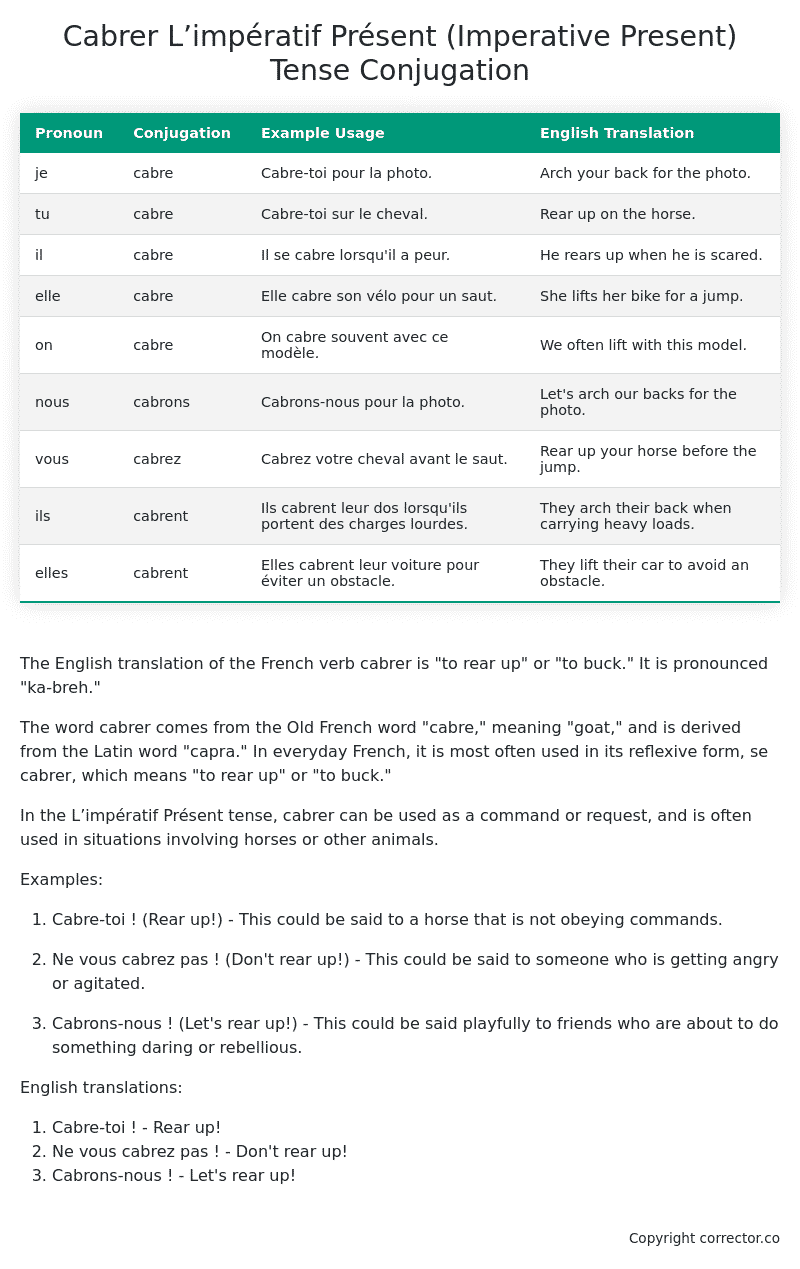L’impératif Présent (Imperative Present) Tense Conjugation of the French Verb cabrer
Introduction to the verb cabrer
The English translation of the French verb cabrer is “to rear up” or “to buck.” It is pronounced “ka-breh.”
The word cabrer comes from the Old French word “cabre,” meaning “goat,” and is derived from the Latin word “capra.” In everyday French, it is most often used in its reflexive form, se cabrer, which means “to rear up” or “to buck.”
In the L’impératif Présent tense, cabrer can be used as a command or request, and is often used in situations involving horses or other animals.
Examples:
-
Cabre-toi ! (Rear up!) – This could be said to a horse that is not obeying commands.
-
Ne vous cabrez pas ! (Don’t rear up!) – This could be said to someone who is getting angry or agitated.
-
Cabrons-nous ! (Let’s rear up!) – This could be said playfully to friends who are about to do something daring or rebellious.
English translations:
- Cabre-toi ! – Rear up!
- Ne vous cabrez pas ! – Don’t rear up!
- Cabrons-nous ! – Let’s rear up!
Table of the L’impératif Présent (Imperative Present) Tense Conjugation of cabrer
| Pronoun | Conjugation | Example Usage | English Translation |
|---|---|---|---|
| je | cabre | Cabre-toi pour la photo. | Arch your back for the photo. |
| tu | cabre | Cabre-toi sur le cheval. | Rear up on the horse. |
| il | cabre | Il se cabre lorsqu’il a peur. | He rears up when he is scared. |
| elle | cabre | Elle cabre son vélo pour un saut. | She lifts her bike for a jump. |
| on | cabre | On cabre souvent avec ce modèle. | We often lift with this model. |
| nous | cabrons | Cabrons-nous pour la photo. | Let’s arch our backs for the photo. |
| vous | cabrez | Cabrez votre cheval avant le saut. | Rear up your horse before the jump. |
| ils | cabrent | Ils cabrent leur dos lorsqu’ils portent des charges lourdes. | They arch their back when carrying heavy loads. |
| elles | cabrent | Elles cabrent leur voiture pour éviter un obstacle. | They lift their car to avoid an obstacle. |
Other Conjugations for Cabrer.
Le Present (Present Tense) Conjugation of the French Verb cabrer
Imparfait (Imperfect) Tense Conjugation of the French Verb cabrer
Passé Simple (Simple Past) Tense Conjugation of the French Verb cabrer
Passé Composé (Present Perfect) Tense Conjugation of the French Verb cabrer
Futur Simple (Simple Future) Tense Conjugation of the French Verb cabrer
Futur Proche (Near Future) Tense Conjugation of the French Verb cabrer
Plus-que-parfait (Pluperfect) Tense Conjugation of the French Verb cabrer
Passé Antérieur (Past Anterior) Tense Conjugation of the French Verb cabrer
Futur Antérieur (Future Anterior) Tense Conjugation of the French Verb cabrer
Subjonctif Présent (Subjunctive Present) Tense Conjugation of the French Verb cabrer
Subjonctif Passé (Subjunctive Past) Tense Conjugation of the French Verb cabrer
Subjonctif Imparfait (Subjunctive Imperfect) Tense Conjugation of the French Verb cabrer
Subjonctif Plus-que-parfait (Subjunctive Pluperfect) Tense Conjugation of the French Verb cabrer
Conditionnel Présent (Conditional Present) Tense Conjugation of the French Verb cabrer
Conditionnel Passé (Conditional Past) Tense Conjugation of the French Verb cabrer
L’impératif Présent (Imperative Present) Tense Conjugation of the French Verb cabrer (this article)
L’infinitif Présent (Infinitive Present) Tense Conjugation of the French Verb cabrer
Struggling with French verbs or the language in general? Why not use our free French Grammar Checker – no registration required!
Get a FREE Download Study Sheet of this Conjugation 🔥
Simply right click the image below, click “save image” and get your free reference for the cabrer L’impératif Présent tense conjugation!

Cabrer – About the French L’impératif Présent (Imperative Present) Tense
Usage
Giving commands
Making requests
Offering advice
Expressing desires
Conjugation Formation
Interactions with other tenses
Want More?
I hope you enjoyed this article on the verb cabrer. Still in a learning mood? Check out another TOTALLY random French verb conjugation!


